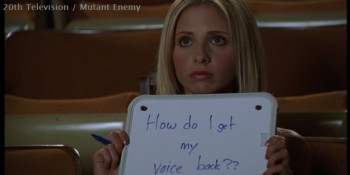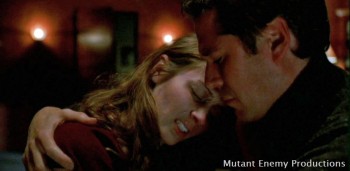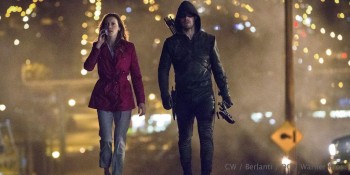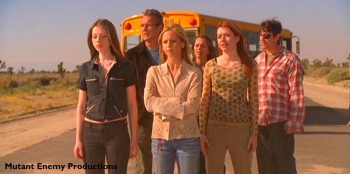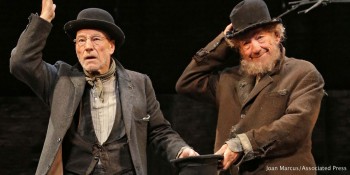A few weeks ago, I shared a list of my 10 favorite Angel episodes, in honor of the 10th anniversary of the finale of Angel. Writing about my favorite Angel episodes also got me thinking about my favorite episodes of its sister show, Buffy the Vampire Slayer.
Coming up with a list for Buffy is actually easier than it was for Angel — a fact that surprised me. I was a bigger fan of Buffy, and the show aired for two seasons more. There are a lot of episodes of Buffy that I love — I could probably make a top 10 list for each season — but when I really sat down and thought about it, certain episodes immediately came to mind as being truly great. I didn’t spend nearly as much time thinking about which episodes should go on this list as I did the Angel list; these all seemed natural choices.
So, without further ado, here are my top 10 favorite episodes of Buffy the Vampire Slayer:
10. “Grave” (Season 6, Episode 22): I have to be honest and say that, overall, season six was one of my least favorite seasons. It was dark and rather depressing. I also had a hard time believing guys like Warren, Andrew, and Jonathan could really be a threat to the Slayer herself (though I love Andrew and Jonathan). However, it made sense in the end that Willow would be the Big Bad of the season. I feel like they had been building toward this possibility for a while — and not just in season six. I really liked the symbolism at the end of this episode, when Dawn and Buffy climbed out of the grave: they were leaving the shadow of Buffy’s death behind once and for all and entering a new stage of life. What I loved most about this episode, though, and what earns it a place on my top 10 list, is that it was Xander who stopped Willow and saved the world. I’ve always loved Xander, and I thought this was a terrific moment for his character.
9. “Amends” (S3, E10): When this episode first aired, The First Evil was just a random bad guy who was easily defeated by destroying a shrine; no one knew how powerful a villain he (she? It?) would later become. I really liked this closer look into Angel‘s character and the things he regretted doing as Angelus. I also really liked the scene with Buffy and Angel on the hill in the end. Sure, the snow was a bit of a deus ex machina, but this was a Christmas episode, so it worked.
8. “Angel” (S1, E7): The first season of Buffy wasn’t perfect, but it did have its moments, and “Angel” was one of them. I thought this episode was well done, including the reveal that Angel was a vampire. Sure, if you were paying attention, you probably suspected it before now, but I liked the fact that they waited for that reveal.
7. “Once More, with Feeling” (S6, E7): Buffy sings! Only Joss Whedon could have pulled off a musical episode of Buffy the Vampire Slayer and have it be just the right amount of cheese. A demon that curses the townspeople with having to sing about their problems? It sounds ridiculous, but in this case it worked and is one of my favorite episodes. I still pull out the soundtrack and listen to it once in a while. I think the best part of this episode, though, is the fact that it’s not just a one-off silly episode. It actually drives the plot of the entire season forward with the huge bombshell that Buffy was happy and in heaven before her friends decided to resurrect her.
6. “Prophecy Girl” (S1, E12): Looking back over my list, I realized I included a lot of season finales, though that wasn’t intentional. They just tend to pack that emotional punch that make them really good episodes. “Prophecy Girl” was no different. The scene in the library, with Buffy and Giles and Buffy’s emotional declaration, “I don’t want to die,” really made this episode; it reminded us that, though she is the Slayer, she is also still a teenager. That, along with the fact that she went to meet the Master anyway, knowing the prophecy predicted her death, really set the tone for Buffy’s character and the entire series. Even though she’s a teenager, she’s not afraid to make difficult choices and sacrifices. This is why I admire her character so much.
5. “Becoming (Part 2)” (S2, E22): This was another finale with a huge emotional punch. Season 2 is possibly my favorite of the entire series. I’m not saying it all went downhill from here — each season has its high points, and some excellent episodes — but this season was extremely well done. The Angelus storyline was brilliant, and it all culminates in one moment at the end of this episode. Willow is finally able to succeed in performing the spell to re-ensoul Angel, but she’s too late. Angelus has already opened a gateway to a hell dimension and the only way to close it is to kill Angel. Killing Angelus would have been easy — Buffy was prepared for that — but watching her kill Angel is heartbreaking.
4. “Chosen” (S7, E22): I really loved season 7. It had its flaws, but, overall, it felt like a final season long before it was announced it would be the last. This episode brought out everything that made Buffy such a wonderful series. It even reunited Buffy and Angel for a brief period. I cried and laughed, felt worried and tense — sometimes all those emotions in just the 10 minutes of action between commercial breaks. The only sense of finality in this episode is the knowledge you have that there will never be a season 8. I loved the feeling of hope at the end and knowing that our beloved characters would continue on.
3. “The Gift” (S5, E22): Buffy willingly sacrifices her life a second time to save the world. This one was much more emotional than the first, however, since there is no bringing her back with CPR. I loved the opening of this episode, where she saves a young guy and his reaction is, “But you’re just a girl.” Buffy responds with, “That’s what I keep saying.” I love the little moments like this that remind us Buffy is much more than a Slayer. She is just a girl and sometimes would love to be just a girl. Her speech to Dawn was also tear-jerking; her line, “The hardest thing in this world is to live in it,” has really stuck with me over the years. The shot of the tombstone at the end lent the episode serious gravity and marked the series’ move from The WB into a new era on UPN.
2. “The Body” (S5, E16): These last two episodes could really be tied for first place, in my mind. “The Body” is one of the most heartbreaking episodes of television I’ve ever seen (possibly second only to Angel‘s “A Hole in the World”). The heartbreak really started in the previous episode, when Buffy came home to find her mother dead on the couch. Hearing Buffy, one of the strongest people you’ll ever meet, call out, “Mommy?” gut-punches me every time. Buffy and her friends deal with death constantly; what makes Joyce‘s death that much harder to take was that it was a natural one; this was no demon or vampire, there was no way Buffy could have done anything to prevent it. In this case, the Slayer is completely powerless. What adds to the tension (and brilliance) of this episode is the fact that there is no soundtrack at all; this gives the entire episode immediacy and a haunting feel. Anya’s breakdown and lack of understanding human emotions was one of the best moments from this episode, which, on the whole, was extremely well done.
1. “Hush” (S4, E10): I’m pretty sure this was the episode that cemented my love for all things Whedon. Not many hour-long series could pull off an entire 20 minutes in which not one character speaks, but Whedon did it wonderfully. This is definitely my favorite episode of the series. I loved how the characters had to make use of other modes of communication (Giles’ transparencies, for one), and the emphasis on expression and movement made the episode so fascinating to watch. I also loved that Buffy’s realization that Riley is part of a secret organization occurs in this episode, where they can’t talk about it until the end — and even when they can speak, they just sit there, staring at each other, unable to think of what to say. Plus, the Gentlemen still give me nightmares and are quite possibly the most terrifying monsters Buffy has fought (although, Gnarl comes in a close second).
As I was making this list, I realized there were several more episodes that couldn’t go unmentioned. So here are five more great episodes, in no particular order:
“The Zeppo” (S3, E13): This episode focused entirely on Xander’s exploits, with Buffy’s fight to stop the apocalypse entirely in the background. Xander will always be one of my favorite characters of this series, and this episode perfectly showcased his character.
“Lovers Walk” (S3, E8): I love Spike, and drunken, emotional Spike returning to Sunnydale was great.
“Something Blue” (S4, E9): This was another episode that I found amusing, as Willow accidentally casts a spell that makes everything she says come true.
“Innocence” (S2, E13): I debated whether this deserved a place on the list over “Becoming (Part 2),” but, ultimately, Angel’s death won me over. Nonetheless, from Buffy’s initial fears that she wasn’t good enough in bed, to her realization that the man she loves no longer exists, just a demon wearing his face — all very well done.
“Passion” (S2, E17): I’ve said before I’m not always a fan of voiceovers, but I thought the limited narration in this episode was powerfully done. This episode is where, in my opinion, everything changes in Buffy’s world. The stakes are raised and consequences become real. People die. And Angelus must be killed.
So that’s my list. What did I miss? Share your favorite episodes in the comments!
